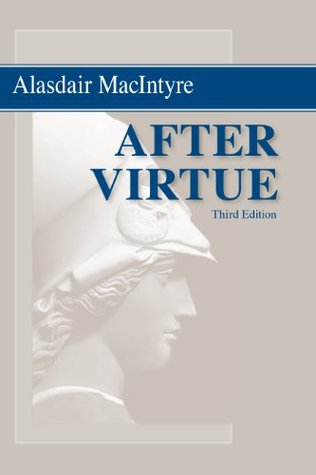More on this book
Community
Kindle Notes & Highlights
the cogency of the Nietzschean rejection and refutation of modern moralities of rules, whether of a utilitarian or of a Kantian kind, did not necessarily extend to the earlier Aristotelian tradition.
Nietzsche’s portrait makes it clear that he who transcends is wanting in respect of both relationships and activities.
But we can now see clearly that, if the account of the virtues which I have defended can be sustained, it is the isolation and self-absorption of ‘the great man’ which thrust upon him the burden of being his own self-sufficient moral authority.
To cut oneself off from shared activity in which one has initially to learn obediently as an apprentice learns, to isolate oneself from the communities which find their point and purpose in such activities, will be to debar oneself from finding any good outside of oneself.
So it was right to see Nietzsche as in some sense the ultimate antagonist of the Aristotelian tradition. But it now turns out to be the case that in the end the Nietzschean stance is only one more facet of that very moral culture of which Nietzsche took himself to be an implacable critic. It is therefore after all the case that the crucial moral opposition is between liberal individualism in some version or other and the Aristotelian tradition in some version or other.
which Hegel and subsequent historicists gave great weight, was that what Kant presented as the universal and necessary principles of the human mind turned out in fact to be principles specific to particular times, places and stages of human activity and enquiry. Just as what Kant took to be the principles and presuppositions of natural science as such turned out after all to be the principles and presuppositions specific to Newtonian physics, so what Kant took to be the principles and presuppositions of morality as such turned out to be the principles and presuppositions of one highly specific
...more
analytic philosophy has become a discipline—or a subdiscipline?—whose competence has been restricted to the study of inferences.
Analytic philosophy, that is to say, can very occasionally produce practically conclusive results of a negative kind. It can show in a few cases that just too much incoherence and inconsistency is involved in some position for any reasonable person to continue to hold it. But it can never establish the rational acceptability of any particular position in cases where each of the alternative rival positions available has sufficient range and scope and the adherents of each are willing to pay the price necessary to secure coherence and consistency.
if for example we regard the principles and categories of Newtonian mechanics as satisfying the requirements of rationality-as-such, we shall obscure precisely that about them which rendered them rationally superior to their only available rivals in the actual context of physical enquiry in the late seventeenth and early eighteenth centuries.
So we cannot say wherein the rational superiority of Newtonian physics consisted except historically in terms of its relationship to those predecessors and rivals whom it challenged and displaced. Abstract Newtonian physics from its context, and then ask wherein the rational superiority of one to the other consists and you will be met with insoluble incommensurability problems. Thus knowing how Newton and the Newtonians actually came to adopt and defend their views is essential to knowing why Newtonian physics is to be accounted rationally superior. The philosophy of physical science is
...more
The history of morality-and-moral-philosophy is the history of successive challenges to some preexisting moral order, a history in which the question of which party defeated the other in rational argument is always to be distinguished from the question of which party retained or gained social and political hegemony.
this kind of historicism, unlike Hegel’s, involves a form of fallibilism;
My account of the virtues proceeds through three stages: a first which concerns virtues as qualities necessary to achieve the goods internal to practices; a second which considers them as qualities contributing to the good of a whole life; and a third which relates them to the pursuit of a good for human beings the conception of which can only be elaborated and possessed within an ongoing social tradition.
Yet the virtues are not related to the goods which provide them with further point and purpose in the way in which a skill is related to the ends that its successful exercise procures or in the way in which a skill is related to those objects of our desire that its successful exercise may enable us to possess.
the goods internal to practices which cannot be achieved without the exercise of the virtues are not the ends pursued by particular individuals on particular occasions, but the excellences specific to those types of practices which one achieves or fails to achieve, moves toward or fails to move toward in virtue of the way in which one pursues one’s particular ends or goals on particular occasions, excellences our conception of which changes over time as our goals are transformed.
the relationship of virtues to practices, once it has been more clearly distinguished from the relationship of skills to practices than I succeeded in doing in my earlier account, does not entail the unfortunate consequences that Scheffler is inclined to impute to it.
no human quality is to be accounted a virtue unless it satisfies the conditions specified at each of the three stages.
Any reconciliation of biblical theology and Aristotelianism would have to sustain a defence of the thesis that only a life constituted in key part by obedience to law could be such as to exhibit fully those virtues without which human beings cannot achieve their telos. Any justified rejection of such a reconciliation would have to give reasons for denying that thesis.


